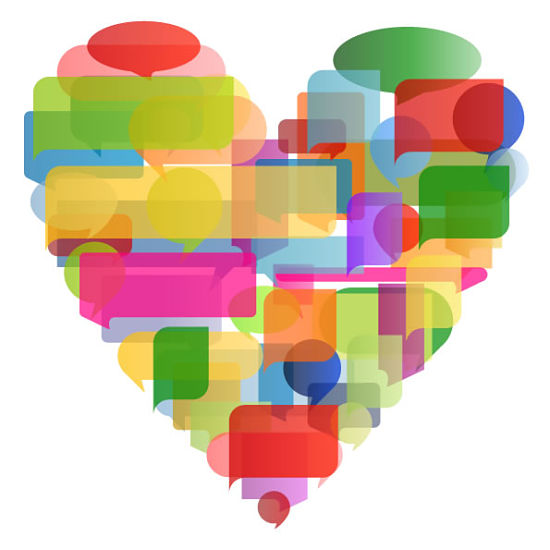The heart contains a little brain of 40,000 neurons that can learn and remember and feel...
http://www.huffingtonpost.com/heartmath-llc/heart-wisdom_b_2615857.html
[h=1]Let Your Heart Talk to Your Brain[/h]
by
Deborah Rozman
When I was a practicing psychologist, sometimes when I'd be working with a client who was confused about an issue or decision, I'd ask, "What would your heart say?" I often adapted a gestalt technique using two chairs. When the client was sitting in one chair, I asked them to speak from their heart and talk to their mind sitting over there in the other chair. Then I'd have them switch chairs and speak from their head, talking to their heart, telling their heart the mind's views and concerns. It was like two different people talking. The heart spoke from genuine feeling and authenticity, in the present. The mind spoke from opinions, fears, shoulds and shouldn'ts. I had them switch chairs several times, until they had an epiphany. Very often the client would realize their heart's voice was their true self, a voice that offered both more intuition and common sense intelligence.
36
This is no coincidence. What's really fascinating is that the
heart contains a little brain in its own right. Yes, the human heart, in addition to its other functions, actually possesses a heart-brain composed of about 40,000 neurons that can sense, feel, learn and remember. The heart brain sends messages to the head brain about how the body feels and more. When I first heard about this scientific research, it intuitively made sense. I had felt for a long time that the heart has its own mysterious way of knowing.
Until the 1990s, scientists assumed and most of us were taught that it was only the brain that sent information and issued commands to the heart, but now we know that it works both ways. In fact, the heart's complex intrinsic nervous system, the heart brain, is an intricate network of several types of neurons, neurotransmitters, proteins and support cells, like those found in the brain proper.
Research has shown that the heart communicates to the brain in several major ways and acts independently of the cranial brain.
One important way the heart can speak to and influence the brain is when the heart is coherent - generating a stable, sine-wavelike pattern in its rhythms. When the heart rhythm is coherent, the body, including the brain, begins to experience all sorts of benefits, among them greater mental clarity and intuitive ability, including
better decision-making.
Although the heart and brain are in constant communication, we can intentionally direct our heart to communicate to our brain and body in beneficial ways. When we experience sincere positive emotions, such as caring, compassion or appreciation, the heart processes these emotions, and the heart's rhythm becomes more coherent and harmonious. This information is sent to the brain and the entire body neurologically, biochemically, biophysically and energetically. You can shift into this coherent state to bring your mind and heart into harmonious alignment and have more access to intuition often in less than a minute. It can take a little practice to do this on demand, but it gets easier and quicker the more you do it.
Here is how, using an adaptation of
HeartMath's "Freeze Frame" decision-making technique:
- When there is an issue causing you stress, write down what you've been thinking and feeling about it.
- Shift into heart coherence using the Quick Coherence Technique.
- In that state, ask yourself what would be a more effective response to this situation, one that will minimize future stress.
- Listen for what your heart has to say. Notice the first feelings and sensations that come to you. Perhaps it's offering a new insight you need, or is saying let go or be patient?
- Write down what your heart says, even if it seems too simplistic.
- Now compare what you wrote in #1 with what your heart said. Which feels better to you? Which has more ease, flow or common sense?
What often blows people's minds is the head saying what seems to be rational arguments that keep the emotions churning, but the heart's wisdom is so clear and releasing and simply feels right. In comparing what they wrote in #1 and #5, people often find the heart more intelligent; the mind more emotional, irrational.
36
I have made letting my heart talk to my brain a way of life because it's much more effective, and offers flow, ease and clarity for me. Whenever I need to, I shift my focus to the heart and ask its guidance. Recently, my mind was wanting to rush ahead and call somebody about an issue there was a deadline for. I got into heart coherence to grasp a deeper connection to the issue. My heart intuition was clear -- don't call now, or I will be reacting out of fear. So glad I waited until I was neutral and calm. The results I get from decisions I make in a heart-coherent state keep confirming the effectiveness of Freeze-Framing for me.
Lately, I hear more and more people across different disciplines and walks of life talking about the heart. People seem to be waking up to the wisdom of letting their hearts guide them, finding it leads them to more joy and fulfillment. This is news that does my heart good.
36 Deborah Rozman, Ph.D., is president and CEO of HeartMath LLC, located in Boulder Creek, California. HeartMath provides scientifically-validated and market-validated tools and technologies that activate the intelligence and power of the heart to dramatically reduce stress while empowering health, performance and behavioral change in individuals and organizations. HeartMath's award winning emWave® technologies monitor and provide real time feedback on heart rhythm (HRV) coherence levels, an important indicator of mental and emotional state. HeartMath also offers training and certification programs for organizations, health professionals and coaches, and a self-paced online personal development program called HeartMastery for individuals.
Dr. Rozman has been a psychologist in research and practice, entrepreneur and business executive for over 30 years. She was founding executive director of the Institute of HeartMath, and now serves on the Institute's Scientific Advisory Board and Global Coherence Initiative Steering Committee. She is co-author with HeartMath founder Doc Childre of the Transforming series of books (New Harbinger Publications): Transforming Anger, Transforming Stress, Transforming Anxiety and Transforming Depression. She is a key spokesperson on heart intelligence and the role of the heart in stress management, performance and wellness.
For more by HeartMath, click here.


